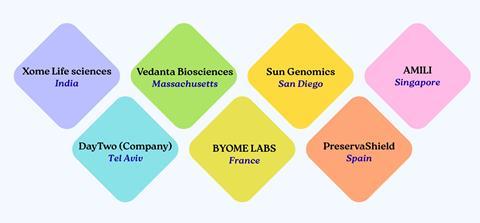For centuries, the career path of microbiologists and other biologists has followed a very similar trajectory – achieving higher academic degrees, most often leading to a teaching or research position, with few entering into diagnostic or industrial R&D positions. These traditional careers will remain important and relevant, but today, they are no longer the complete story of any career. Across the globe, innovators, entrepreneurs, and business leaders in the field of microbiology are responsible for shaping the global bioeconomy. The next-gen microbiologists are not only the researchers, but the problem solvers and architects of the new economy that will provide vital career options for upcoming microbiologists.
Microbiology careers – a new, expanding horizon
Microbiologists are well known for their challenging role in tackling pandemic situations, food security, sustainable farming, antimicrobial resistance, climate resilience, environmental pollution, energy, and other healthcare-related issues. In short, they are the key players for achieving the Sustainable Development Goals worldwide. But, in order to resolve these problems in every corner of the world, publications or patents are not enough. It will require commercially viable and economically sustainable solutions, marketable products or services, changes in policies, and impactful business value.
We need leaders, not researchers, who can convert translational research into real, economically viable ventures. This will not only solve the above problem, but can also be a pathway to employment for all strata of society. Careers in policy making, developing regulatory compliance for microbiology or life sciences, and AI/ML and data-driven research are priorities of the global economy. Science communication and consulting are other important career options for microbiologists, as scientific achievement should reach households worldwide.
In every corner of the world, from the US to Singapore, Europe to India, academia is now collaborating with industry to fulfil need-based gaps and establish breakthrough start-ups. Microbiologists, along with scientists from other domains, have joined hands and created new ventures in the field of precision and personalized medicine, synthetic biology, fermentation, bioplastics, new diagnostic methods, microbial engineering, and many other businesses, which have led the economy into innovation-driven growth. They have initiated the roadmap of entrepreneurship as a lucrative alternative career option over traditional pathways.
Innovation ecosystems throughout the globe
In the recent past, microbiologist-entrepreneurs have received huge support from government grants, angel investors, venture capitalists, and accelerators all over the world. Governments are rightly supporting academic research to transform it into successful commercial startups.
Similarly, the Indian government is prioritizing life science-based innovation and encouraging scientific entrepreneurs through various initiatives under the following sectors:
- BIRAC (Biotechnology Industry Research Assistance Council) provides nationwide seed funding and mentorship, from students to late-stage startups
- DST Technology Business Incubators nurture early-stage innovations through critical development phases
- Atal Innovation Mission embeds entrepreneurial thinking into academic institutions
Various schemes are enabling Indian researchers to work on innovations and develop globally competitive enterprises. All these businesses will uplift India’s socio-economic needs and will make India a self-reliant nation. Still, there are several hurdles for early or mid-career scientists, such as a lack of awareness, the risk and challenges of switching, and limited exposure to entrepreneurship, all of which limit the entrepreneurial mindset of researchers. But, with recent developments and a cultural transition, microbiologists nowadays are more interested in becoming entrepreneurs and innovators, rather than just researchers or academics.

Entrepreneurship, innovation, and translational research
Getting patents or publishing high-impact research articles is not enough to address many global challenges in public health, climate issues, food safety and security, and environmental pollution. Data in patents and publications must be translated or commercialized, from lab to land, or bench to bedside, to reshape society and to enhance the economy.
Entrepreneurship means not only doing business, but also helping microbiologists take ownership of their own science and research, alongside creating new identities as businesspeople. Microbiologists can excel by getting freedom to work independently with their own ideas, instead of waiting for limited or sometimes unsatisfactory academic positions.
A successful business requires knowledge in market dynamics, regulatory compliance, product competitiveness, and investor mindset. These are important alongside understanding customer needs, the supply chain, and other related strategies. Failure is also part and parcel of entrepreneurship; hence, entrepreneur-microbiologists must learn how to sustain failure, take calculated risks, and learn from the experience. Academia and professional bodies must encourage microbiologists to explore entrepreneurship as an alternative career and showcase diverse success stories, along with regular academic knowledge.
The role of incubation centres and mentors
Mentors play a prime role in the entrepreneurship ecosystem and can break the monotonous thinking around career options for microbiologists. Mentors can be the bridge between industry, incubation centres, and microbiologists who want to pursue their careers in business. Mentors and incubation centres can boost their confidence, nurture their interdisciplinary skills, show them the right path, and build a strong professional network in the world of scientific business. Next-gen microbiologists must train themselves to be comfortable in a boardroom or in a policy forum, similar to the laboratory. These attributes can be developed and nurtured by incubation centres and mentorships. These can inspire students and early-stage researchers to attend innovative bootcamps, hackathons, business summits, and investor meet-ups.
Conclusion
Today, we need microbiologists to be not only academics or researchers but also budding innovators, entrepreneurs, and business leaders. Career possibilities in this domain are vast; as people can build their own ventures, become policy makers, and employers. Entrepreneurs can address many pressing challenges and develop the bioeconomy by transforming themselves into the business leaders of the future.
Further reading:
Microbiologists and the Bioeconomy: Powering Innovation | ASM
Microbiology in the 21st Century: Where Are We and Where Are We Going? | ASM
Translational Research in Applied Science | Cambridge Scholars Publishing








No comments yet